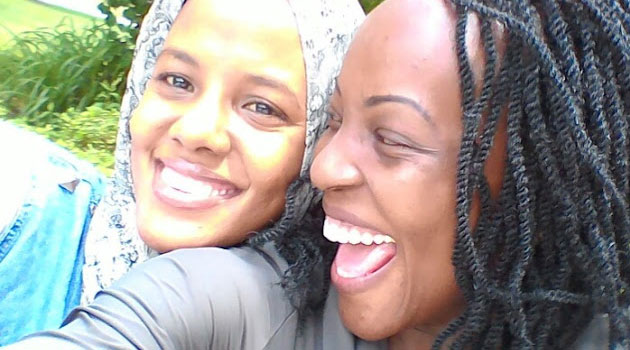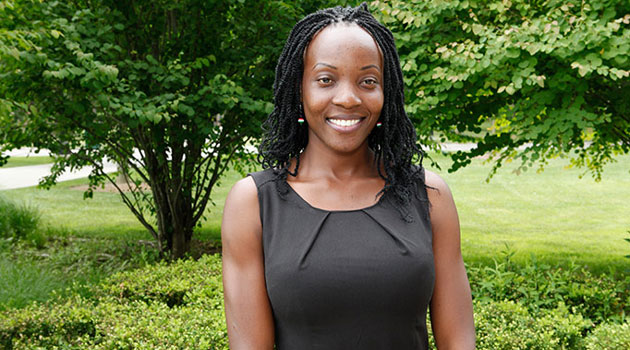“You media people really frustrate me at times. Do you really know that access to information is a right enshrined in the constitution of Kenya?” Reads a text message I recently received from Miss Georgine Auma.
She was born 30 years ago and raised in Kisumu on the shores of Lake Victoria. The 6th in a family of 10.
“I was not born deaf,” she starts narrating to me. “ While in class 3 when I was 9 , I suffered from a mumps infection that made me lose my hearing.
I lived in isolation until I joined university when I came across a school for the deaf in Maseno. That was the beginning of my journey into deaf hood. Before that, I was in my own world of silence and since I had never met anyone like me growing up, I thought I was the only deaf person in the world.
You won’t believe how happy I was to finally be with people that gave me a sense of belonging.
At Maseno, I was pursuing a bachelor’s degree in Special needs education and specializing in Deaf Education came naturally for me.
What is the difference between being physically deaf and immersed in Deaf culture?
To be physically deaf is to have hearing loss. That’s it. We use a small‘d’ to refer to this group of people.
Not anyone with hearing loss identifies themselves as being ‘Deaf’. People who are physically deaf tend to identify themselves with the hearing people and regard their hearing loss solely on medical terms.
They might or might not communicate via sign language. To be immersed in Deaf Culture is to be culturally deaf and have a strong deaf identity.
They are often proud to be deaf, hence the capital ‘D’. It might also include interpreters who regard themselves as culturally deaf and identify with Deaf culture.
It’s important to note that the Deaf community has its distinct culture that comes from interactions among themselves and the use of sign language.
It’s the same with some people being referred to as ‘black’ and others ‘African-American’.
Are all deaf people part of Deaf culture?
There are deaf people who identify more with the hearing community than the deaf community (personal choice).
They may prefer to use speech as a mode of communication (some are late-deafened and can talk).
They may also not accept the fact that they cannot hear. Those who are part of Deaf culture are proud of their deafness; they wear it as a crown with pride, use sign language as their primary mode of communication and interact mainly with members of the Deaf community.
Do you see being Deaf as a disability?
I would be lying if I said being Deaf is not disabling. It is, at so many levels, especially it being an invisible disability and people trying to justify it as not being “disabled enough”.
You see, you cannot tell someone is Deaf by simply looking at them. The way our society is set up, lacking the ability to ‘talk’ normally makes you “abnormal”. Everything you go through will depend on your ability to hear or not.
What I can say however is that being Deaf need not put limitations on what one can achieve as an individual. We are capable just like everyone else. Once upon a time, we were told Deaf people can’t drive, because we can’t hear.
Today I know a dozen Deaf persons who are even Uber drivers. One doesn’t need to hear to enjoy music. We have an aspiring Deaf musician. For me as a person I consider my inability to hear the greatest gift I have been given to be of service to others.

Georgine Auma (R) was born 30 years ago and raised in Kisumu on the shores of Lake Victoria/LEON LIDUGU
Why do you feel media frustrates you?
The Access to information act was passed in 2016. It gives every citizen the right to access information (Part 11, no. 4(1a, b), (2).
As we are all aware the right to access information for many Deaf people in Kenya is yet to fully realize.
Let’s take TV stations for example, before the enforcement of Act on access to information; only Parliament proceedings were being interpreted followed by KTN news.
Additionally the interpreter’s box on screens in most TV stations is too small for anyone to watch for long without straining the eyes. Any attempt by the Deaf community to lobby for the increase of the inset has been turned down by either being told they are unappreciative, or threats to make it even small, or worse to remove the inset all together because it is apparently blocking some of the features.
So we have interpreters on TV but we cannot still understand much of what is being said. The background also sometimes makes it impossible for the interpreter’s hands to be visible. I ask again, what is the point?
Any other challenges you face?
As a person or as a community? I will answer both.
At a personal level, the lack of access to information and communication pretty much limits everything else. Your participation in the society is unlimited.
Your participation in politics is limited. Your participation in national building is limited. You cannot attend county budget forums because there are no interpreters.
You cannot participate in community events because there are no interpreters and you cannot even attend important meetings and functions because what the use of sitting in a 2 hour meeting without understanding anything?
As a community, our challenges are more or less the same.
Hospitals have misdiagnosed deaf persons because of communication breakdown, inability to access lifesaving information; deaf people have been wrongfully detained, convicted because they wouldn’t speak up for themselves.
Court cases where deaf victims seek justice drag on and on for years because ‘no interpreters’ during hearings.
We have been denied jobs we were qualified for because ‘hiring a deaf person is expensive’.
Access to education opportunities? I will not even go there. You can’t get admission to certain courses, colleges because they do not have interpreters.
I personally spent 4 years in university doing self-study. It was either I do that, or stop attending classes. I choose to persevere and lobby for accessibility.
I am glad those who joined Maseno after me have been able to attend lectures without missing out.
What do you think the solution is?
Make sign language a compulsory subject in Kenyan schools.
Imagine going in a hotel and you just order food like anyone else without people looking funny at you or running away when you sign.
The constitution compels all government services to be accessible. Hospitals, Schools, government offices, police, and the justice system all need to implement accessibility provisions and disability mainstreaming guidelines.
Give Deaf people opportunities. Break barriers. Offer them platforms to shine and contribute positively to the society.
When it comes to recruiting sign language interpreters, it is standard international practice to have deaf persons as panelists/interviewers to make sure the people who get the jobs are of quality.
Knowing to sign doesn’t make one an interpreter. You can know so many signs, but still can’t construct a full sentence in Kenyan Sign Language.
How then can you interpret on a platform like TV? The only time the Deaf have been consulted is when parliament was employing interpreters.
It wouldn’t be fair to say all of them are fakes, some are good.
Again if you want to be an interpreter and you know for sure your skills are still wanting; why not make efforts to improve before you go on a nationwide platform where you are going to enact more barriers?
In the end it’s the consumers (the Deaf) who will continue to lag behind.
The government’s classic response to complaints and lobbying by Deaf community is that they do not have funds for implementation.
While there are various laws, policies and provisions for ensuring access to information, only few have been implemented. Most TV programs are inaccessible.
Even those urging us Deafies to take vaccines, to vote and file tax returns must realize that we still have a long way to go.
We are making baby steps, but I believe with renewed efforts the Deaf community will finally enjoy their rights to access information like other Kenyans.
We might even be in a position to do away the interpreter onset by having closed captions on TV.
This will ensure what is said is produced in real time. Actually more effective and error free than interpreting.
Media really needs to wake up.
What programs have we seen so far that address the accessibility to needs of the Deaf community?
Having television programs with captions/subtitles is a good place to start.
So far, I can’t point out any.
Any advice for the media?
It’s possible to accommodate all Kenyans with diverse needs without isolating us to one TV station.
If mainstream TV stations are unwilling to make accessibility adjustments for the Deaf community, then it’s still an effective way of elimination barriers to accessing information.
I’d rather we all accommodate every Kenyan and get the same news rather than putting us into a box because we happen to use a different language of communication.
With technology this is possible.
Do you guys know that you actually left us with only one interpreter in a tiny box on screen to update and and furnish us with the 2017 elections coverage?
How are we even supposed to make informed decisions if you are subjecting us to this?
Just do the right thing .
(This is an article by Leon Lidigu, a practicing journalist)










































